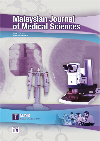
|
Malaysian Journal of Medical Sciences
School of Medical Sciences, Universiti Sains Malaysia
ISSN: 1394-195X
Vol. 23, No. 3, 2016, pp. 57-63
|
 Bioline Code: mj16034
Bioline Code: mj16034
Full paper language: English
Document type: Research Article
Document available free of charge
|
|
|
Malaysian Journal of Medical Sciences, Vol. 23, No. 3, 2016, pp. 57-63
| en |
Translation and Validation of Bahasa Malaysia Version of Urogenital Distress Inventory (UDI-6) and Incontinence Impact Quality of Life Questionnaires (IIQ-7), a Cross Sectional Study
Nusee, Zalina; Rusly, Azizah; Jamalludin, AR; Abdulwahab, Dalia F & Ismail, Rozihan
Abstract
Background: Urinary incontinence (UI) demonstrates major prevalence in women of
different population groups. Reduced quality of life (QOL) is observed due to incontinence problems.
Urogenital Distress Inventory (UDI-6) and Incontinence Impact Quality of Life (IIQ-7) are useful
disease-specific questionnaires evaluating the impact of urinary incontinence on the QOL of women
which is accepted internationally.
Objective: This study aims to translate and validate UDI-6 and IIQ-7 in Malay language.
Methods: A cross sectional study, which recruited 100 participants from two urogynecology
clinics. Both questionnaires were initially translated from English to Bahasa Malaysia followed
by back translation and final correction done by the professional translators. The participants
were requested to maintain a urinary record of the upcoming week for three days that assisted in
quantifying the severity of symptoms. None of the subjects were assigned any treatment during the
study period. Validity and reliability of the translated questionnaires were determined by checking
the internal consistency and also by doing test-retest.
Results: The internal consistency levels of the UDI-6 and IIQ-7 Bahasa Malaysia questionnaires
were 0.73 and 0.90 respectively with good test-retest (0.86 and 0.95). Incontinence episodes were
strongly associated with obstructive, irritative, and stress symptoms. The factor of day time voiding
had strong correlation with obstructive and irritative symptoms.
Conclusion: UDI-6 and IIQ-7 did not measure similar outcomes; however, both questionnaires
have their strengths in clinical settings. Analysis has also revealed that the Malaysian versions of
both questionnaires had appropriate test-retest validity and reliability. Thus, it can be said that
both of the questionnaires had great importance for screening patients with urinary incontinence in
Malaysia.
Keywords
Urinary incontinence; Quality of Life; Bahasa Malaysia translation; Bahasa Malaysia Validation; Urogenital Distress Inventory; Incontinence Impact Questionnaire
|
| |
© Copyright 2016 - Malaysian Journal of Medical Sciences
Alternative site location: http://www.medic.usm.my/publication/mjms/
|
|
